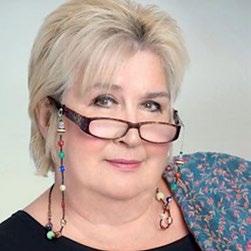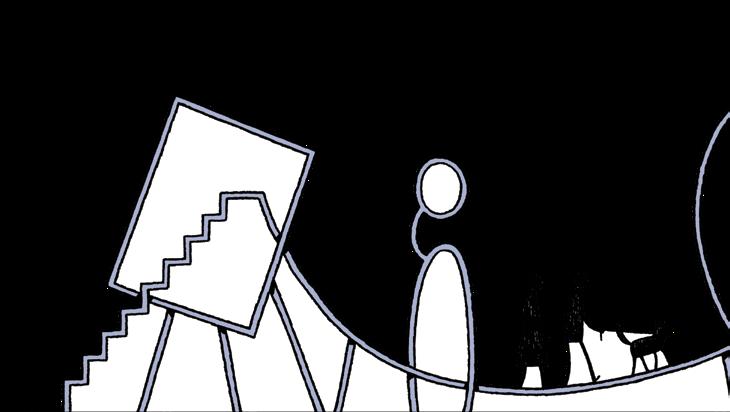Town Mouse
The Handy guide to going out in style tom hodgkinson
When it comes to creating a good life, my hero is the great management guru Charles Handy, who recently celebrated his 89th birthday. Handy’s wife died three years ago. He then had a stroke, which paralysed his left side. But he still maintains a healthy mix of country and town life, shuttling, with his carer, between a flat in Putney and a cottage in Norfolk. Here he writes and reads in the morning and plays croquet and meditates in the afternoon. Handy came to fame in the 1970s with his books, Gods of Management and later The Empty Raincoat, in which he told corporate types to attend their soul as well as their bank balance. Handy’s manuals sold millions of copies, and led to lucrative speaking gigs at Arthur Andersen, the accounting firm which has since morphed into the awkwardly named Accenture. As well as his books and public speaking, he’s found time for plenty of grand jobs. After Oxford, where he ran a stationery-printing business, he worked – fairly miserably – at Shell, and then fairly happily at the London Business School. From 1977 to 1981, he was 32 The Oldie September 2021
Warden of St George’s House at Windsor Castle, where his boss was Prince Philip, and from 1987 to 1989 he was Chairman of the Royal Society of Arts. Although he works in the corporate field, he’s really a philosopher and a creative thinker. I first met him in 1994, when I interviewed him for my recently launched magazine, the Idler. At the time, he was spending three months of the year at his place in Tuscany with his wife, Liz, ‘doing very little’, he said. He spent the other nine months in London, where he dashed about making money by telling middle managers to get a life. He very much approved of idling and thought people should do more of it. I found him kindly, avuncular, modest and generous and we became pals. Recently he’s been reflecting on his impending death with characteristic humour and honesty. He told me, ‘I woke up, feeling pretty weak, I must say, and pretty sure that I had a heart attack coming on, which I’d been warned would happen. So when my cleaning lady said to me in a sprightly way, “How are you this morning?”, I said, “I think it’s the day I’m going to die.” And she said, “Never mind!” ’
Charles was not amused by this breezy comment. At first, he was furious. He had just made the most important statement of his life and she had dismissed it as inconsequential. But then he reflected that she was right. He says, ‘It is part of the great scheme of things, like the walnut tree I grew 50 years ago, which grew and flourished and dropped its nuts all over the floor, and now it’s wilting and fading and weakening, just like me, and soon will go.’ I drove up to his Norfolk cottage for lunch over the summer to find him in excellent form, self-effacing as ever. I asked him about the circumstances of his stroke. ‘I was in a car with some friends,’ he replied, ‘and they said I started blabbering nonsense.’ ‘How could they tell the difference from the normal you?’ I teased – producing a massive gale of laughter. His carer, Margi, makes his meals and watches telly with him in the evening. ‘We’re running out of shows about sex and intrigue in high places,’ he said. He is visited often by his son, Scott, head of drama at Eton. His daughter, Kate, an osteopath, lives in the downstairs flat in Putney. ‘They both used to consider me a failure because I didn’t live in Notting Hill,’ he says. After lunch, Mrs Town Mouse and I visited his wife’s grave in the churchyard a few moments from his house. There’s a sign next to it saying ‘Reserved’. Handy thinks of himself as a Stoic. Like the first Stoics, he believes in a great scheme of things, which the ancient Greeks called logos or ‘the system’. Christians call it God and others call it fate or, like his housekeeper, the great scheme of things, of which we are a part. The great events of our life are dictated by the great scheme. How we respond to them is up to us, he says. It depends on our character and it shapes our character. Contemplating his imminent demise has proved a positive experience. He says, ‘Pondering my life and saying goodbye to all the people and things I loved has been remarkably pleasant and, yes, enjoyable. Somehow, once you accept the inevitable, it becomes much easier.’ Death also means no more responsibility, he thinks. He no longer has to worry about anything – even about paying off the overdraft. Somebody else will have to do that. He says, ‘I shall be in a box in the ground, not far from where I’m sitting now in my much-loved Norfolk countryside.’ There are worse ways of ending up.






































